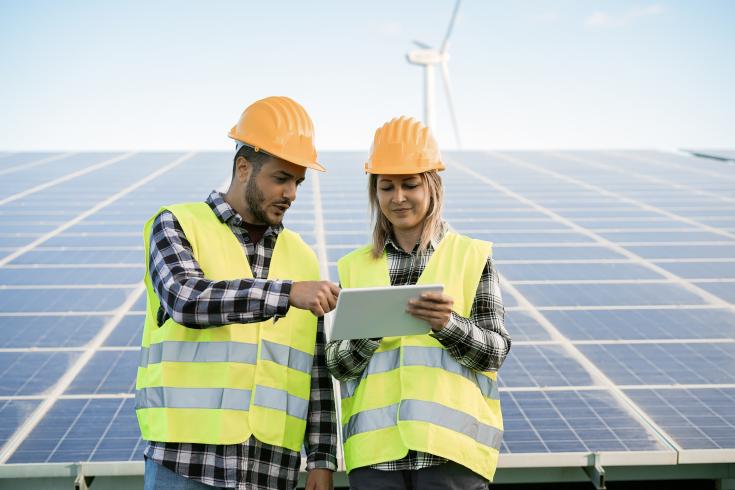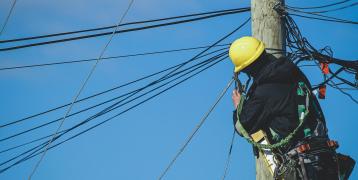Skills for the energy transition
A just transition – skills, citizens and communities
Europe’s ambitious targets for sustainable energy set the pathway for significant economic growth in the sector with job creation along the value chain from manufacturing to installation and renovation, operation, and maintenance.
Despite this, there is increasing resistance to the level and speed of investment in low-carbon technologies and several European countries have begun to slow their low-carbon commitments, as politicians seek to handle the fall-out of the current economic crisis.
Individuals, despite broadly supporting the low-carbon transition, are increasingly viewing it as a cost and a burden, with the German Finance Minister recently calling EU plans “enormously dangerous”, and claiming that people fear they “make it harder for them to live in their own homes and be able to pay for it.”
Policymakers at all levels need to make the benefits of the transition felt in people’s lives, empower communities and individuals, and make the argument for the socio-economic benefits of the transition.
The socio-economic case for sustainable energy
At this point, the need for decarbonisation is widely appreciated – 93% of EU citizens believe climate change is a serious problem, and 88% believe the EU should achieve net zero by 2050 – but we need to still enable citizens to make the transition, and bring this wide support to the local level to unlock the significant benefits available.
In the European Union, in 2021, around 1.47 million people were employed in the renewable energy sector alone, with a turnover of 185 billion EUR – a 13% increase on 2020. The potential for further growth in renewables, to say nothing the building renovation or other low-carbon sectors, is incredibly significant.
Indeed, the European Commission estimates that to reach Europe’s REPowerEU energy targets, more than 3.5 million additional jobs will need to be created in the sector by 2030.
Policymakers need to argue clearly for the socio-economic benefits of the transition, and its strong job creating potential, emphasising also how the transition contributes to improving quality of life, including improving health and tackling energy poverty.
This then requires local and regional actions to bring citizens into the energy transition, whether working in green jobs, owning, and operating renewable energy technologies themselves – individually or as part of an energy community – or otherwise feeling the benefit of the transition.
Enabling growth through training and skills
The high job potential of the energy transition can only be realised if there is the workforce to implement it. The European Commission has recognised this in the framework of the current European Year of Skills, with the launch of several skills partnerships.
This includes the large-scale renewable energy skills partnership, which seeks to equip workers with the skills and expertise needed to produce, install and maintain renewable energy technologies. This builds on earlier work also funded by the Commission in BUILD UP Skills, which has targeted the construction sector.
Public authorities at all levels need to consider the need for energy skills in their territory, consider this in their strategies and plans and develop new training and educational opportunities.
Those regions that take the lead will be able to reap the benefits, creating new jobs and businesses, while becoming exporters of services, and enhancing their energy security by diversifying their energy sources, improving efficiency and building resilient infrastructures.
Public authorities can support these new opportunities through local frameworks. The IEA’s Global Commission on People-Centred Clean Energy Transition recommends that authorities maximise the creation of decent clean jobs with new technology and infrastructure investments to stimulate the demand side, while developing tailored support for communities through support for reskilling and training, engaging in stakeholder engagement, and better co-ordinating the work of energy, employment and education departments.
Authorities can start by empowering dedicated organisations with a training mandate, such as an energy agency, or an existing training provider. The training to be delivered should be based on regional needs and the technologies with the highest demand and potential.
Efforts should not only target students and young people but also focus on the upskilling and reskilling of existing building professionals.
Empowering citizens
At the same time, regions need to empower citizens to understand their energy options and to take part in the transition. One-Stop-Shops can help any household to understand their options, access finance, and matchmake with skilled providers and installers, thus acting as demand-side stimulators and educational entities.
Greater effort also needs to be put into developing energy communities and district approaches. Jointly owned installations can bring down costs while also enabling households to benefit from low-cost and sustainable energy.
Renewable Energy Communities need their own kinds of training and education – not only the technical skills of installers and operators, but also skills in people management and engagement, business, and financial management, permitting and procurement, amongst many others. Local authorities should also be sure to provide support and training on these issues, not only on hard technical skills.
Policy solutions
Discover the policy solutions that are available on this topic.
By Simon Hunkin, Thematic Expert for a Greener Europe and more Connected Europe.
Simon has eight years' experience in the low-carbon economy sector, working in projects and studies to support uptake of innovative low-carbon technologies and policy instruments. He is specialised in European energy and environment policy, as well as regional policy and funding and co-operation initiatives.



